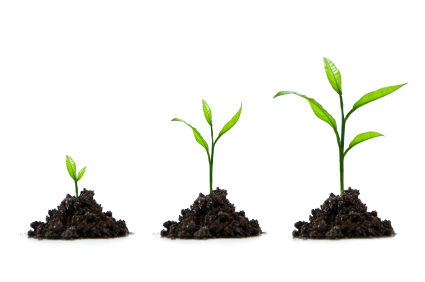Note: This post on the growth mindset has been incorporated into 10 Ways to Be a Better Learner – an essential read for the serious lifelong learner.
Each of us arrives in the world with a particular genetic makeup, and as a result, innate advantages or disadvantages in how well we deal with life’s opportunities and challenges. Each of us is also subject to outside forces that are largely beyond our control, such as whether we are born into wealth or poverty, or where we live the early years of our lives. Clearly, the children of highly intelligent, affluent parents have a leg up in life, yet again and again we see people who seem to have no particular genetic or economic advantages get ahead in the world.
Why is this?
Carol Dweck, professor of psychology at Stanford University, has spent years researching what differentiates people who achieve and maintain success. She’s boiled it down to a simple dichotomy – individuals have either a growth mindset, or a fixed mindset. Consistently successful people have a growth mindset – a belief that they can always learn, grow, and become better at whatever they set their sights on.
This is in contrast to the fixed mindset that holds so many people back – a belief that whatever talents or abilities one has are basically innate and not changeable to any significant degree. Success, it would appear, is fundamentally connected to and a consequence of learning, and those who learn best are those who believe they can learn.
| Fixed Mindset | Growth Mindset |
|---|---|
| Believes intelligence, personality, and other qualities are not changeable | Believes intelligence, personality, and other qualities can be developed |
| Declines opportunities to stretch beyond current abilities | Embraces challenges and the opportunity to learn |
| Often gives up when the going gets tough | Persists even when faced with significant challenges |
| Does not take criticism well | Accepts criticism constructively |
| Views the success of others as a threat | Learns from the success of others |
A particularly powerful conclusion of Dweck’s work is that simply being conscious of the dichotomy between the growth and fixed mindsets can make a tremendous difference.
In Mindset:The New Psychology of Success, Dweck writes that:
Just by knowing about the two mindsets, you can start thinking and reacting in new ways. People tell me they start to catch themselves when they are in the throes of the fixed mindset – passing up a chance for learning, feeling labeled by a failure, or getting discouraged when something requires a lot of effort. And then they switch themselves into the growth mindset – making sure they take the challenge to learn from failure, or continue their effort.
(Dweck 2008, 216)
I’ve emphasized the importance of consciousness again and again on the Mission to Learn blog. To learn and to grow, we must consciously tune into the opportunities that are around us, as well as the barriers that may be unnecessarily holding us back. Those of us who self-identify as lifelong learners already do this to a significant degree; we already embrace the idea of the growth mindset even if we’ve never heard it called by this name. But it’s important to recognize that we bring different mindsets to different circumstances. Even the avid learner may have many areas in her life where a fixed mindset rules. One key to becoming a better learner is to ferret out these fixed mindset areas, and where appropriate, replace them with a growth mindset.
I say “where appropriate” because the goal is not to try to grow and change at all times in all aspects of life – that would be exhausting. But in the areas that feel most meaningful to us, where we feel motivated to put in time and effort regardless of external rewards like money or recognition, a growth mindset can be particularly powerful.
Believing we can improve and excel tends to create a self-fulfilling prophecy; little by little we become more competent, and as psychologist Edward Deci has established, this feeling of competency leads to a sense of satisfaction and fuels our intrinsic motivation. “The ‘rewards’ linked to intrinsic motivation,” Deci writes in Why We Do What We Do, “are the feelings of enjoyment and accomplishment that accrue spontaneously as a person engages freely in the target activities.”
Thus, feeling competent at the task is an important aspect of one’s intrinsic satisfaction. The feeling of being effective is satisfying in its own right, and can even represent the primary draw for a lifelong career. People realize that the more they invest in a job, the better they will get at it, and thus the more intrinsic satisfaction they will experience.
(Deci and Flaste 2008, 63)
Ironically, while the growth mindset and the achievement it fuels usually benefit from planning, goals, and rewards, at its core it is not about these things. It is about openness, curiosity, and a willingness to take risks and try new things. To borrow from the ideas of Zen master Shunryu Suzuki, having a “beginner’s mind” is the key to learning:
In the beginner’s mind, there is no thought. “I have attained something.” All self-centered thoughts limit our vast mind. When we have no thought of achievement, no thought of self, we are true beginners. Then we can really learn something. (Suzuki 2008, 22)
In the beginner’s mind, there is no thought. “I have attained something.” All self-centered thoughts limit our vast mind. When we have no thought of achievement, no thought of self, we are true beginners. Then we can really learn something. (Suzuki 2008, 22)
Suzuki’s concept, rooted in Eastern philosophy, is not dissimilar from psychologist Mihály Csíkszentmihályi’s scientific investigations into the mental state he has labeled “flow.” For Csíkszentmihályi, “flow” is the state we achieve as we stretch ourselves in practice and focused attention and essentially “lose” ourselves in the task at hand. “Flow” is the ultimate learning state, and I would argue that the growth mindset is at its root.






Pingback: Self Directed Learning – What Does It Really Involve? | Teachers Tech
Pingback: Tweets that mention 10 Ways to Be a Better Learner: No. 1 – Growth Mindset -- Topsy.com